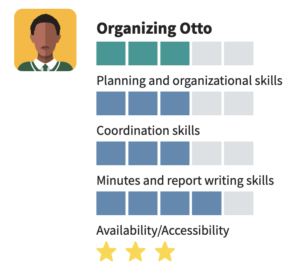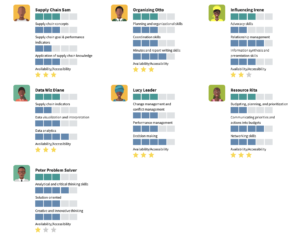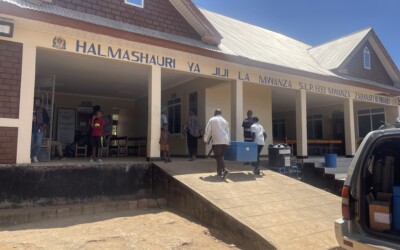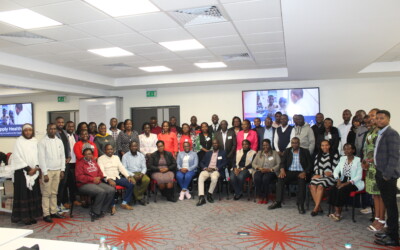What are IMPACT teams?
IMPACT teams are quality improvement teams that have been adapted to provide a structured and rigorous process for supply chain problem solving. They are a system of interconnected teams, made up of people across functions and disciplines who meet routinely and are:
- trained to develop, interpret and set targets for key supply chain indicators and use action oriented dashboards
- encouraged to follow a structured, problem-solving process
- empowered to use their data for operational and strategic decisions with the ultimate goal of continuously improving the performance of their supply chain.
The IMPACT teams approach was first implemented across 10 counties in Kenya and while it proved to be effective in terms of improving supply chain outcomes, the approach and effects were not sustained when the first intervention ended. This prompted the team to use Human Centered Design (HCD) research, subsequent insights, and experience gained through implementation to redesign the IMPACT teams approach with a view to greater ownership and institutionalization. Based on the HCD findings, our first design included a framing and self-assessment that mapped teams based on systems and structures critical for data use. However, after a few months of implementation, our adaptive learning process showed that this framework was not useful for differentiating team capacity, which in turn affected our ability to support teams to grow and mature. We went back to our HCD findings and revisited our insights. We zeroed in on how building capacity on key skills, creating a mentorship system, and continuous learning opportunities would motivate ownership and institutionalization of IMPACT teams. This led to a second ideation and prototyping phase where we described IMPACT teams through the lens of role profiles (or personas) and articulated the journey of core role profiles and teams towards increased learning, maturity and institutionalization.
What are the “role profiles”, how were they created?
A well-rounded, effective IMPACT team has competencies in seven major areas: supply chain skills, problem solving, organization, data analysis and visualization, leadership, advocacy, and resource mobilization. To make these competencies more actionable and less theoretical, the inSupply Health team created “role profiles” – archetypes of those competency areas.


Each role profile has a fun, alliterative name (e.g. “Supply Chain Sam”) and a graphic representation of this person: “Influencing Irene” has a chartreuse headwrap and blouse, thick-framed glasses, and a pearl necklace, whereas “Supply Chain Sam” is wearing a tank-top and looks ready to lift a box onto a truck or complete a warehouse inventory.
Supply Chain Sam, Data Wiz Diana, Peter Problem Solver, and Organizing Otto are considered the core team members and Lucy Leader, Influencing Irene and Resource Ritah are enabling team members. Core team members have skills needed for day to day data use, actions and decision making and are important for all meetings, while enabling members play a more strategic role and offer support for unlocking bottlenecks or challenges outside the mandate of core members.
How was the team self-assessment developed?
We designed a new team self-assessment that focused on determining if teams had the knowledge, skills and competences associated with these 7 role profiles and if team members associated with the role profile were available to the team when needed. For each role profile, we identified three core sub-topics to structure the assessment around, with each of these having a set of questions developed for the assessment. Lucy Leader assessment, for example, focused on change management, performance management, and decision making. Role profiles are not associated with positions in the health system, allowing for flexibility for anyone on the team with the required skills to play that role. This is a critical aspect that ensures IMPACT teams can be designed across a variety of contexts, even when human resources are constrained.
Building the form on the website
The IMPACT team Portal (SCDataUse.org) is built using an open source content management system – Drupal – that is used widely in government and civil society organizations. Drupal has a sophisticated survey-builder called Webform and we used this to create the Role Profile Assessment.
Conducting the assessments
The assessment is organized into different sections, one for each of the role profiles. Each section is composed of two pages. The first page asks users to respond to statements using a Likert scale (1 = none; 5 = all). When they complete these questions and advance to the second page, they see a data visualization of their team’s competencies in that particular role profile. The competencies are represented in a way reminiscent of selecting a character for a video game: there’s a graphic depiction of the role profile to the left, with an overall score and three component scores to the right. Below the scores is a field where the team can assign a number of stars to rate the role’s availability/accessibility. For availability/accessibility, the teams go through a reflection process to identify individuals that play that role in their team. They then assess the availability/accessibility of the individual/individuals to the team using a 3 points star scale (1=Rarely available/hard to reach, 2=sometimes available/can be reached, 3 =Always available/easy to reach).

The team continues on for the different role profiles until they reach the last page, which shows all seven role profiles with their associated scores in a grid. Seeing all these profiles next to each other, the team can then reflect on the strength of their team: Which profiles scored lower? Did some profiles score high, but were never available? How can the team become more well-rounded and effective?

The value of the Role Profile Assessment goes beyond one specific IMPACT team alone. Managers at different levels of the Ministry of Health with different permissions can view results at the district/county, region, or national level and compare competencies between teams. This enables data-informed decision making in how they allocate resources to bolster teams’ effectiveness.
Learning Packages
As a complement to the Role Profile Assessment, which helped IMPACT teams pinpoint room for improvement or growth in skills required, inSupply Health created four learning packages focused around each core role profile. These are self-directed, online, modular courses designed to build competencies for IMPACT team members to improve supply chain and data use processes. If a team scored low in the “Supply Chain Sam” role profile, they can take the Supply Chain Sam learning package, which is available on the IMPACT team portal without needing any additional website credentials or a new application – it’s all available on SCDataUse.org. In this way, individually or as a team, they can chart their own progress in data use and supply chain management.
Content Development for the Learning Packages
The curriculum design and development process started with the creation of learning objectives associated with the competencies and skills for each role profile. Again, we went back to our HCD insights to define key requirements that guided the development and usability of the learning packages, keeping in mind the primary users were busy health workers all of whom may not have laptops. Some of the requirements were that learning was to be delivered in short and modular formats, needed to be self-directed, available on mobile phones, and include tests for competency. We developed the packages on Articulate Rise and both curated and created content drawing from the JSI logistics management and supply chain training manuals and courses, inSupply’s practical experience from previous IMPACT team support and technical assistance, and best in class examples based on a literature review and review of free courses (YouTube, Udemy etc.). We beta tested the content and utilized the user feedback to improve it. Upon completion of the packages, we assessed the learners and awarded certificates for those who scored above 80%. Individuals were allowed to retake the courses for up to three times to achieve the minimum competency score.
Successes
The assessment has so far been used by both already established IMPACT teams and newly formed IMPACT teams to identify capacity gaps for each role profile as they work towards strengthening their team effectiveness. Fifty one IMPACT teams across four counties (Kenya =46, Tanzania=3, Mozambique=1 and Sierra Leone =4) have so far applied this framework to assess their teams. This list will continue to grow as inSupply Health continues to receive requests for technical support with establishing IMPACT teams in other countries.
As of October 2022, more than 456 individuals across Kenya, Tanzania and Sierra Leone have been certified for the various learning packages with 59 certificates issued to inSupply staff who also took the courses. The course for Supply Chain Sam had the highest uptake with 154 learners certified, followed closely by Organizing Otto with 119 certified, Peter Problem Solver with 102 certified, and Data wiz Diana with 81 certified. While we did not have an opportunity to have the teams reassess themselves using the role profile assessment yet due to COVID-19 complications, we have seen the improvement of teams over time.
The introduction of the role profile assessment, the learning packages, and other forms of technical support provided to IMPACT teams such as mentorship and refresher trainings all contribute to strengthening the performance of IMPACT teams and reducing their dependency on technical assistance. Examples of areas where improvements were witnessed include: coordination of meetings, capture of action plans, technical data analysis skills, and better understanding of supply chain management.
Summary
The role profile assessment enables teams to effectively self-identify technical and behavioral skill gaps among themselves as individuals and as a team. The assessment was not only useful in shaping the content for the learning packages, but it also helped the inSupply team curate the technical support provided to the different teams based on their biggest technical competency and knowledge gaps.
Also, the assessment was instrumental in increasing the synergy among teams as it created the awareness of the need to work as a team and not rely on one individual to play most of the roles in the team. This over-reliance on one team member to play multiple roles often resulted in either the IMPACT team meetings not happening when the individual was away or the meetings being ineffective.
inSupply introduced the assessment mid-way during the implementation of the IMPACT teams. In future, we are looking forward to utilizing the assessment both to establish the baseline as the teams are formed and to routinely assess changes in the technical competency over time for the different role profiles.


